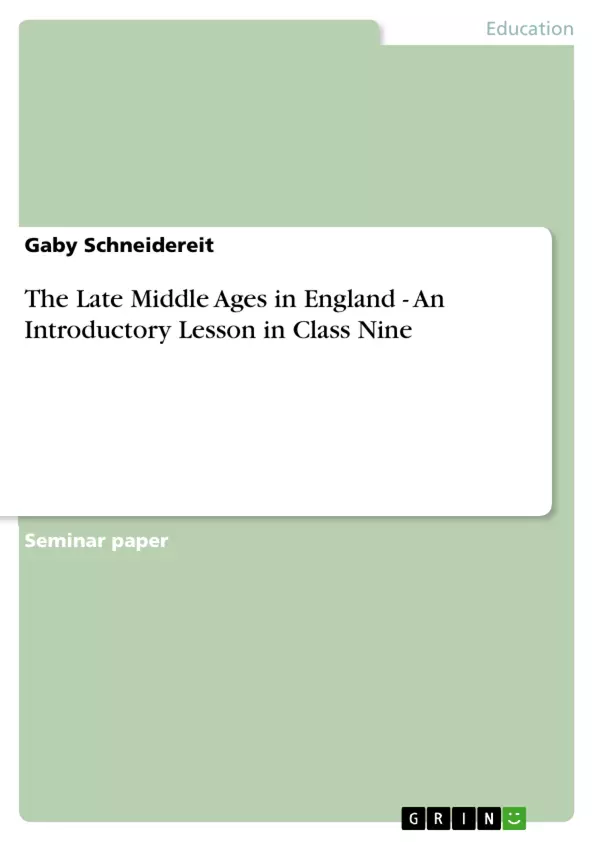The following piece of work entirely dedicates itself to the era of the Late Middle Ages. My model lesson does not concentrate on a particular aspect of this era, but gives an overview of a lot of topics. It can therefore be regarded as a multifunctional preparatory lesson: the first step into the overall thematic is portrayed and lots of occasions are given to find different fields to reflect upon. I prefer this open – but fixed – thematic because my target is not to provide the pupils with an overdose of facts. I want to offer them a general idea, an outline of the Middle Ages and would rather like them to understand the mentality of this time than to learn too many facts and dates by heart. According to the authors of the SMART-study, my approach is right: “the need to provide an overview, a framework, a sense of unity and coherence [is characterized as] centrally important”. Apart from that, I pursue the aim of enabling the children to read medieval literature. The knowledge of the medieval way of thinking is an important condition in order to study written works dating from this era. It is interesting that we are looking back to ancient times because of two reasons: on the one hand, we want to get an impression of the living conditions which formed the background of medieval literature. On the other hand, “medieval history and literature […] [are] simply essential to a proper understanding of our own [stress: Ga.Sch.] society, which is not only heir to, but to a large degree the creation of, the Middle Ages”. Consequently, this epoch actually does not need any justification, its significance even in today’s life makes it obvious enough why we should deal with this topic at school. We live in a society which is coined by the Middle Ages, and this has to be mirrored in school life as well – “we cannot study literature or political history […] in isolation; all of our studies are ultimately studies of the entire culture of the Middle Ages”3. That implies that the Middle Ages, their diversity and mysteriousness, their inventions and effects on our present time, are just part of our general knowledge, and one cannot avoid to be confronted with them. In my essay I will design a fictitious English lesson in a ninth class of a Grammar School. [...]
Table of Contents
- Introduction
- Main part: My fictitious lesson
- Information on the course of the unit and general teaching aims
- Warming-up
- Motivation
- Introduction of the new subject matter
- Assimilation
- Homework
- The choice of the teaching aids used
- Conclusion
- Appendix
Objectives and Key Themes
This lesson aims to introduce students to the Late Middle Ages in England, particularly under the reign of King Richard II. It aims to provide a basic understanding of the period's background and context, enabling students to engage with works from that era, particularly Geoffrey Chaucer's "Canterbury Tales". This introductory lesson seeks to generate interest and encourage active participation in the overall unit, emphasizing the relevance of medieval times to the present day.
- The importance of the Middle Ages for understanding our own society
- The influence of medieval thought and experiences on modern times
- The historical and social context of Geoffrey Chaucer and his work
- The diversity and complexity of life in the Late Middle Ages
- The role of medieval literature in shaping English culture
Chapter Summaries
The introduction outlines the purpose of this lesson, emphasizing the need to provide a comprehensive overview of the Late Middle Ages for a ninth-grade class. It highlights the importance of understanding medieval mentality and thought processes for comprehending medieval literature. The main part details the author's fictitious lesson for a ninth-grade class, outlining the lesson's structure, objectives, and teaching methods. It discusses the selection of teaching aids and the anticipated student response. The conclusion provides a summary of the lesson and its relevance to the overall unit on Chaucer's "Canterbury Tales". The appendix contains additional information related to the lesson.
Keywords
The main keywords and focus topics of this lesson are: Late Middle Ages, England, King Richard II, Geoffrey Chaucer, "Canterbury Tales", medieval mentality, historical context, teaching methods, and student engagement.
Frequently Asked Questions
Why is studying the Late Middle Ages relevant today?
Modern society is a creation of the Middle Ages. Understanding this era's mentality and social structures is essential for a proper understanding of our own political and cultural history.
Who was King Richard II in English history?
Richard II was a monarch of the Late Middle Ages whose reign serves as a historical backdrop for studying the social and political complexities of 14th-century England.
What are Geoffrey Chaucer's "Canterbury Tales"?
They are a collection of stories written in Middle English that provide a vivid and diverse portrait of various social classes and life in the Late Middle Ages.
What is the focus of the introductory lesson for class nine?
The lesson aims to give students a framework and general idea of medieval mentality rather than overwhelming them with facts and dates, preparing them to read medieval literature.
How does medieval literature shape English culture?
Works from this era laid the foundation for the English language and established literary traditions that continue to influence Western culture.
- Quote paper
- Gaby Schneidereit (Author), 2003, The Late Middle Ages in England - An Introductory Lesson in Class Nine, Munich, GRIN Verlag, https://www.grin.com/document/38557



